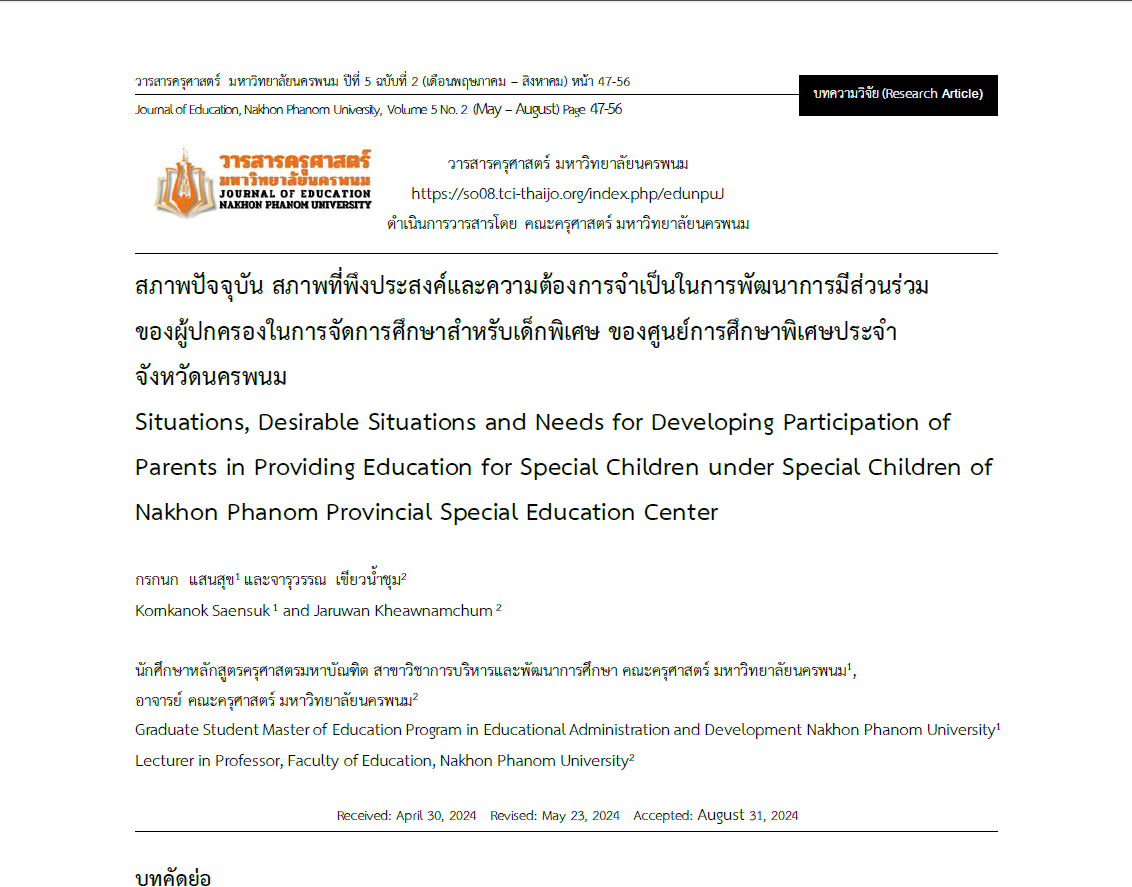SITUATIONS, DESIRABLE CONDITION AND NEEDS IN PARTICIPATION OF PARENTS IN EDUCATIONAL MANAGEMENT FOR SPECIAL CHILDREN OF NAKHON PHANOM PROVINCIAL SPECIAL EDUCATION CENTER
Main Article Content
Abstract
The participation of parents in the educational management for children with special needs contributes to genuine cooperation and relationships between schools and parents. The purposes of this study were (1) to examine the current and desirable situations regarding parental involvement in the educational management for children with special needs, and (2) to assess the needs for parental involvement in the educational management for children with special needs. The sample group comprised 162 individuals, including parents of students attending the Special Education Center in Nakhon Phanom Province in the academic year 2023. The sample size was determined using Krejcie and Morgan's table, employing simple random sampling through a lottery method. The study used a five-rating scale questionnaire, consisting of two versions: (1) a questionnaire assessing the current situations of parental involvement in the educational management for children with special needs, with an index of content congruence between .80-1.00, discriminant power between .25-.69, and overall reliability of .94; (2) a questionnaire evaluating the desired situations of parental involvement in the educational management for children with special needs, with an index of content congruence between .80-1.00, discriminant power between .24-.93, and overall reliability of .98. Statistical analysis included percentage, mean, standard deviation, and Modified Priority Needs Index (PNIModified).
The results revealed that (1) the current situation participation of parents in the educational management for children with special needs were generally at the high level, and the desired situations were at the highest level. (2) The results of the needs assessment regarding the parental involvement in the educational management for children with special needs ranked from highest to lowest average values in the following areas: promoting school activities, developing individualized education plans, promoting developmental activities for children with special needs, creating an appropriate environment, and participating in measurement, assessment and result summarization.
The results revealed that (1) the current state of Participation of Parents in the educational management for children with special needs is generally at a high level, and the desired state is at the highest level. (2) The results of the needs assessment regarding the parental involvement in the educational management for children with special needs ranked from highest to lowest average values in the following areas: promoting school activities, developing individualized education plans, promoting developmental activities for children with special needs, creating an appropriate environment, and participating in measurement, assessment, and result summarization.
Article Details

This work is licensed under a Creative Commons Attribution-NonCommercial-NoDerivatives 4.0 International License.
บทความที่ได้รับการตีพิมพ์เป็นลิขสิทธิ์ของวารสารครุศาสตร์ คณะครุศาสตร์ มหาวิทยาลัยนครพนม ข้อความที่ปรากฏในบทความแต่ละเรื่องในวารสารครุศาสตร์เล่มนี้เป็นความคิดเห็นส่วนตัวของผู้เขียนแต่ละท่านไม่เกี่ยวข้องกับมหาวิทยาลัยนครพนม และคณาจารย์ท่านอื่น ๆ ในมหาวิทยาลัยฯ แต่อย่างใด ความรับผิดชอบองค์ประกอบทั้งหมดของบทความแต่ละเรื่องเป็นของผู้เขียนแต่ละท่าน หากมีความผิดพลาดใด ๆ ผู้เขียนแต่ละท่านจะรับผิดชอบบทความของตนเองแต่ผู้เดียว
References
เก็จกนก เอื้อวงศ์. (2564). รูปแบบการจัดการเรียนรู้สำหรับนักเรียนระดับการศึกษาขั้นพื้นฐานที่ได้รับผลกระทบจาก
สถานการณ์โควิด-19. กรุงเทพฯ: สำนักงานเลขาธิการสภาการศึกษากระทรวงศึกษาธิการ.
กรมสุขภาพจิต. (2562). คู่มือฝึกและดูแลเด็กออทิสติกสำหรับผู้ปกครอง. (พิมพ์ครั้งที่ 2). กรุงเทพฯ: โรงพยาบาล
ยุวประสาทไวทโยปถัมภ์.
จินตนา ประดุจพงษ์เพ็ชร์ และสมหมาย อ่ำดอนกลอย. (2561). รูปแบบการมีส่วนร่วมของผู้ปกครองเพื่อส่งเสริมทักษะ
การเลียนแบบของเด็กออทิสติก. วารสารครุพิบูล, 5(2), 187-201.
ทวีศักดิ์ สิริรัตน์เรขา. (2561). คู่มือฝึกและดูแลเด็กออทิสติกสำหรับผู้ปกครอง. (พิมพ์ครั้งที่ 2). กรุงเทพฯ: พรอสเพอรัสพลัส.
ทิพย์ภารัตน์ ไชยชนะแสง. (2561). การมีส่วนร่วมของชุมชนในการส่งเสริมพัฒนาการเด็กอายุ 1 – 2 ปี. Journal of
Nursing and Health Care, 35(4), 176–184.
บุญชม ศรีสะอาด. (2560). การวิจัยเบื้องต้น (พิมพ์ครั้งที่ 10). กรุงเทพฯ: สุวีริยาสาส์น.
สำนักบริหารงานการศึกษาพิเศษ. (2558). หลักสูตรสำหรับเด็กที่มีความต้องการจำเป็นพิเศษระยะแรกเริ่มของศูนย์
การศึกษาพิเศษ ฉบับปรับปรุง พุทธศักราช 2558. กรุงเทพฯ: สำนักบริหารงานการศึกษาพิเศษ.
สุทธานันท์ กัลกะ. (2561). การช่วยเหลือเด็กออทิสติก: กรณีศึกษา. รามาธิบดีพยาบาลสาร, 24(3), 227-238.
สุภัสจิรา วงษ์มาดิษฐ์. (2559). พฤติกรรมการมีส่วนร่วมของผู้ปกครองในการบริหารการจัดการศึกษาของโรงเรียนบ้านไผ่
สีทอง จังหวัดสุพรรณบุรี. [การค้นคว้าอิสระศึกษาศาสตรมหาบัณฑิต: มหาวิทยาลัยศิลปากร]. ฐานข้อมูลงานวิจัย
(ThaiLis).
สุวิมล ว่องวาณิช. (2558). การวิจัยประเมินความต้องการจำเป็น. กรุงเทพฯ: จุฬาลงกรณ์มหาวิทยาลัย.
อาริสรา ทองเหม และประพิมพ์ใจ เปี่ยมคุ้ม. (2560). การมีส่วนร่วมของผู้ปกครองในการส่งเสริมพัฒนาการเด็กออทิสติกที่
สถาบันสุขภาพจิตเด็กและวัยรุ่น. วารสารวิจัยและพัฒนาการศึกษาพิเศษ, 6(2), 21-36 .
Krejcie & Morgan. (1970). Determining Sample Size for Research Activities. Education and
Psychological Measurement.
Pahae, S. (2017). The Paradigm of Educational Technology in the Digital Age. Phare, Thailand:
PhareThaiUtsahakarnpim.


